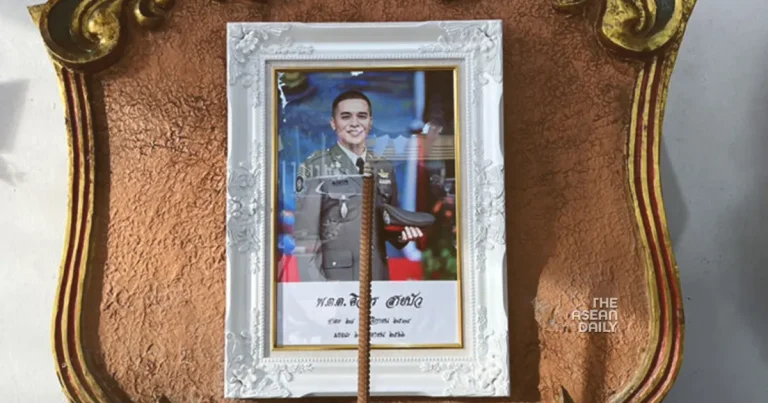28-9-2023 (BANGKOK) A shocking murder at a dinner party in Thailand has thrust the issue of police corruption back into the spotlight, threatening to lift the lid on the cosy ties between law enforcement and influential figures in the country.
The brazen killing of a police inspector occurred at a party attended by over two dozen officers in the town of Si Chiang Mai. The inspector was shot multiple times at point blank range after reportedly refusing a request from the party’s host, a local government official and businessman, to promote his relative to a senior police role.
According to eyewitness accounts, a heated argument broke out between the two men. Shortly after, one of the host’s henchmen entered the room and gunned down the inspector in full view of the other dumbstruck partygoers. Another officer was also wounded by a stray bullet in the chaos.
Remarkably, none of the 20-odd armed police officers at the party intervened. Some fled the murder scene, while others allegedly helped cover up the crime by removing evidence. Local reports indicate one officer even released the gunman after confiscating his pistol, allowing him and the local official to escape with a police escort.
The businessman-turned-suspect later surrendered to the police, denying any culpability. The trigger-happy gunman, however, was shot dead in a violent confrontation with officers. Investigators are now probing the official’s dodgy business dealings with the local government.

This latest murder has cast a harsh light on the endemic corruption within the Thai police force, and the improper relationships between officers and influential figures across the country. It also highlights the government’s ongoing failure to deliver meaningful police reforms, eroding public trust at a time when Thailand is attempting to rebuild its battered tourism industry after Covid.
Little Progress on Police Reforms Over the Past 25 Years
Remarkably little has changed regarding police graft since Thai economist Pasuk Phongpaichit’s seminal book ‘Guns, Girls, Gambling, Ganja’ 25 years ago, which exposed how illegal enterprises like gambling, prostitution and drug-trafficking funded the corrosive ‘money politics’ that enabled police corruption.
In 2018, the police accounted for the most defendants in corruption and misconduct cases heard in Thailand’s Criminal Court for Corruption. And just last month, a damning report by the National Anti-Corruption Commission revealed 86% of police stations nationwide failed assessments for integrity and transparency – over four times the average failure rate for government agencies.
Additionally, a nationwide survey this month found 86% of Thais believe some police officers and officials protect and serve mafia-style influential figures.

In response to the latest murder, Thailand’s new Prime Minister Srettha Thavisin promised to purge such ‘mafia-like infiltration’ from the force. However, the government’s lacklustre reactions suggest it is not serious about eliminating criminality within the police, instead focusing on vague plans to compile lists of ‘mafia-like gangs and politicians’.
Pheu Thai and its precursor parties have collectively held power for over nine years – ample time to tackle police corruption, had they truly wished to do so. Moreover, former premier Thaksin Shinawatra, the de facto leader of Pheu Thai, is unlikely to spur reform. As a former police lieutenant colonel himself, Thaksin oversaw the brutal ‘War on Drugs’ in 2003, which led to over 2800 extrajudicial killings.
Nor are Pheu Thai’s new coalition partners, formerly political opponents, likely to enact meaningful change. When previously in power, they dithered on laws governing police administration, only rushing through a toothless police ethics code after a suspect died in custody in 2021 – which this latest scandal proves has been ineffective.
With police reform absent from Pheu Thai’s priorities, and the coalition bogged down by policies aimed at shoring up rural support, it is hard to see how the new administration will tackle engrained police criminality.
Tourism Goals Undermined by Police Corruption
The government is relying heavily on rebuilding Thailand’s battered tourism industry, which previously contributed 20% of GDP. The spokesperson stated tourism “is the only economic engine that can still run” and plans to attract 40 million visitors in 2024 – a 29% increase over 2021.
However, persistent reports of police corruption continue to damage Thailand’s reputation, especially among Chinese tourists, its second-largest market. The government recently waived visa requirements for Chinese citizens to boost arrivals.
But over the years, multiple cases have emerged of police allegedly kidnapping, extorting or harassing foreign tourists. Just this year, six officers were indicted for allegedly extorting money from a Taiwanese actress caught vaping, which is illegal in Thailand.
Even more alarming are allegations that around 110 immigration officers, including generals, helped Chinese gangsters stay illegally in Thailand between 2020-2022. Over that period, kidnappings of Chinese nationals for ransom surged, raising fears of police complicity with organised crime.
Such alarming cases will continue denting Thailand’s image abroad, jeopardising plans to rebuild tourism, especially from China. However, based on past form, the government is more likely to make placatory statements until public outcry over this latest scandal subsides, and then quietly drop the issue of police reform once again.
Without properly addressing engrained corruption and criminality in the police force, the government’s economic plans will remain on shaky ground. Although the latest appalling murder has thrust the issue back into the open, there seems little political will to tackle reforms that successive administrations have long avoided.




